At the end of their trial, the Occupy Nine were judged and sentenced on April 24. All of the mitigating speeches were read from the dock, and the nine were split up – with four heading for prison. The parting words of one of the four – who was under police escort as they headed off to the prison check-in centre – were “defeat the evil law.”
The words were those of Legislative Councillor Shiu Ka-chun. He was referring to the Fugitive Offenders Ordinance amendment bill, scheduled by Hong Kong’s government for speedy passage through the Legislative Council.
Tanya Chan, one of the guilty nine, had her sentencing deferred pending treatment for a recently discovered brain tumour. Her last Facebook post before surgery said kill-the-bill, or to be precise: “stand firm against the evil law, and against evil people as well.”
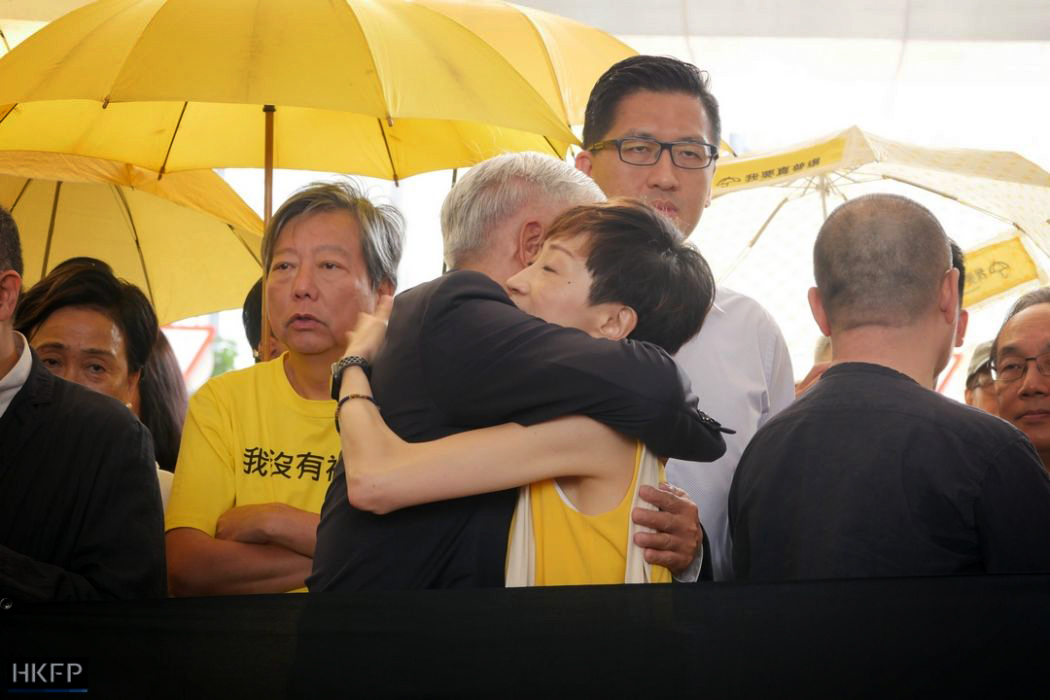
The timing couldn’t have been better, or worse, depending on where you stand in Hong Kong’s polarised political climate. For Beijing and Chief Executive Carrie Lam’s subordinate Hong Kong government, the new “evil” extradition law controversy, coinciding with the sentencing of the Umbrella activists, has allegedly created one big “headache” upon another, and with a third waiting in the wings.
Next up is something even more divisive. Hong Kong is constantly being reminded that the much-feared Article 23 national political security legislation must also be passed because Beijing says so. And so does Article 23 of Hong Kong’s post-colonial Basic Law constitution.
The amended extradition bill is seen as a kind of preparatory step – a way of introducing mainland judicial culture through the backdoor by eroding the barriers between mainland party-directed law enforcement and Hong Kong’s common law system of judicial independence. In any case, it’s not just a simple common-sense means of bringing wrong-doers to justice, as the official promoters like to say.
The legislative update, formally the Fugitive Offenders and Mutual Legal Assistance in Criminal Matters (Amendment) Bill 2019, will allow Hong Kong to return wanted suspects, on a case-by-case basis, to all jurisdictions with which Hong Kong has not concluded formal extradition agreements. Hong Kong has such agreements with only 20 countries. The chief sticking points, however, are not all the many other jurisdictions but only one: the mainland and derivative complications involving Taiwan, and Macau.
The potential risks for anyone sent to face justice in China’s legal system are too well known to try and deny. Nor are the safeguards Hong Kong’s legal drafters have written into the amendment proposal adequate to override such fears.’
Explainer: ‘This is not a meeting’ – Turmoil at the legislature over Hong Kong’s China extradition plan
The immediate pretext is a young Hongkonger, Chan Tong-kai, accused of murdering his Hong Kong girlfriend while they were holidaying in Taiwan last year. He returned to Hong Kong and was soon arrested. But the circumstances of his case are such that Hong Kong may not be able to hold him, on other related charges, much beyond October.
Unwilling to address the larger implications, the Chief Executive is determined to get this job done with the Legislative Council approving the amendments, before the coming summer recess in July.
For all those who identify with the imprisoned Occupy leaders and sympathise with their movement, the appearance of the Bill has reminded them why they resist and created a new burst of political energy at a time when all seemed lost.
People power
It’s wrong to think as many do, including many activists themselves, that no one is paying attention. Marching and demonstrating may keep protesters’ spirits up and ideals alive, they say, but rewards are few and disappointments many. The effort too often has no impact where it counts most – among the powers that be.

This was, in effect, the message that Judge Johnny Chan tried to convey in the trial of the Umbrella activists. In his judgment on the nine leaders that the government chose to prosecute, he dismissed the argument saying that since Hong Kong’s government had responded to past demonstrations of people power, so officials might realistically have been expected to heed the pleas of those who sat themselves down on city streets and remained there for 79 days in 2014.
This was “naïve,” he said. The protesters should have known their effort would be in vain, thus reinforcing their responsibility for creating an unnecessary “public nuisance.”
So, it seemed like another routine gesture of defiance when Hong Kong’s protest-events organiser, the Civil Human Rights Front, called another Sunday afternoon demonstration on April 28. It would be the second protest within a month against the government’s high-pressure tactics aimed at passing the extradition bill amendments. The first was held on March 31. Police then said turnout was around 5,000; protest organisers claimed 12,000.
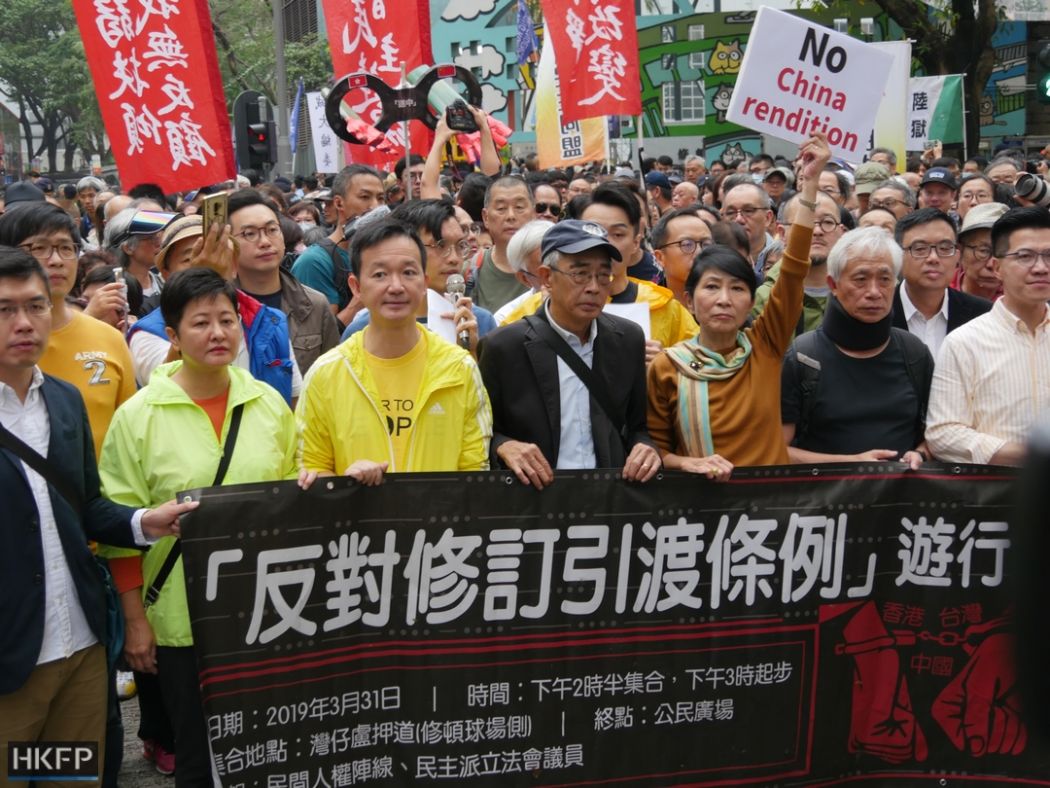
Police permission is required for public processions and organisers must provide turnout estimates in advance. Hence the designated starting point for the April 28 march was the short one-block street in the Causeway Bay shopping district that has become the space where low-key low-volume marches are permitted to marshal their forces.
They were also scheduled to set out later than usual but instead had to begin before the appointed hour. So many people had crowded into East Point Street, and the adjoining Lockhart Road back-up area, spilling over into another side street as well, that the crush was too great to sustain for long. Much greater than police or organisers had anticipated.
But as usual, their turnout estimates were far apart: 22,000 said the police, 130,000 said Front organisers, with little attempt to reconcile the two. The impact nevertheless came from the size of the crowd, certainly more than 22,000, which was what gave official onlookers cause to contemplate their “headache.”

It was the largest turnout since the July 1, 2014 march, when preparations for Occupy were in full swing. And it was the size of the crowd that allowed sympathisers to herald a “reawakening” – the revival of fading spirits after so many election defeats, candidate disqualifications, negative court judgements, and prison sentences.
The formal theme for the day was again the “evil” extradition bill, summed up in an irreverent slogan: “Oppose Returning to China,” which in Cantonese has an even worse, funereal, connotation.
But the sense of the crowd and signs and slogans along the way also reflected public anger over the sentencing four days before, on April 24, of the Occupy nine. The 16-month prison terms for the two main leaders – Professors Benny Tai and Chan Kin-man – were seen as a step too far, beyond the realm of justice. That sense was reinforced by photographs of the men, handcuffed and in brown convicts’ garb, as they left for their maximum-security prison destinations.
The angry mood lightened somewhat when marchers reached the halfway mark, midway between Causeway Bay and the Legislative Council complex in Admiralty, where Occupy had begun on September 28, 2014. At the half-way point, in its usual spot, was the Justice Defence Fund platform, a new feature of protest marches in recent years, to help pay lawyers’ fees and court costs.
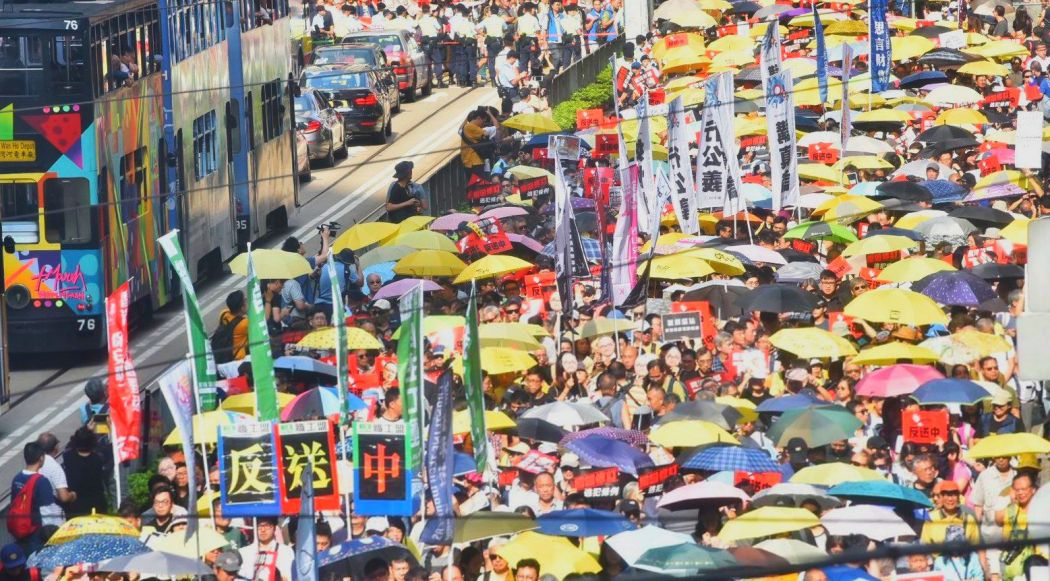
The three main Occupy leaders – Professors Tai and Chan, and Reverend Chu Yiu-ming – have been the star attractions at this midway point on marching days. But on April 28, the two professors were absent. Only Reverend Chu was on hand to represent the trio, plus Catholic Cardinal Joseph Zen, a long-time supporter, along with Tanya Chan and another defendant Lee Wing-tat. Chu and Lee had emerged from the trial with guilty verdicts but suspended prison sentences.
The total sum collected was HK$2.7 million, a record contribution to the defence fund in a single day, and another indication of where sympathies lay.
Relevant others
All the official players have remained steadfast in proclaiming their disregard for the public protest and in their determination to force the bill through Hong Kong’s Legislative Council (LegCo). Pro-democracy numbers there are depleted by the government’s systematic post-2016 effort to weed out dissenters by all legal means possible.
Approval for the amendment bill is now seen by the Hong Kong government as a matter of “political loyalty to Beijing,” so there can be no turning back. The Chief Executive, they say, will therefore not retreat.

The window of opportunity is also narrow, limited not only by the legal status of the accused but also by the need to strike before the democratic caucus might be rebuilt in next year’s 2020 LegCo election.
The business community
There is nevertheless one consideration that officials are not inclined to ignore. Hong Kong’s value to Beijing is as much about economics as national sovereignty and political power. It follows that the business community is all-important in this equation; business people and their representatives have come out in surprisingly strong opposition to the proposed legislative update.
So much so that the Hong Kong government has already agreed to remove nine white-collar crimes from the original list of 46 extraditable offences. The offences must also carry prison terms of more than three years, instead of just one year as originally proposed. The original proposal also excluded crimes not acknowledged as such in Hong Kong and those punishable by the death penalty.
Yet the business people are still not satisfied. Those with cross-border business interests want more. As it happened, pro-establishment Legislative Councillor Michael Tien was among those expressing shock at the size of the April 28 turnout.
It was his elder brother, James Tien, a founder of the pro-establishment pro-business Liberal Party who was similarly shocked at the size of the anti-Article 23 protest on July 1, 2003. So much so that he withdrew his party’s votes for the government’s national security bill, thus causing it to be returned to the shelf where it remains to this day.

Michael Tien is also among those who have suggested the government should try another option by arranging for Hong Kong courts to exercise extra-territorial jurisdiction over crimes if they are committed by Hong Kong citizens elsewhere. Suspects could be returned for trial here.
More recently, he has called on the government to retreat and withdraw the bill altogether. Besides being elected to LegCo, representing New Territories West, Michael Tien is a selected member of Hong Kong’s National People’s Congress delegation.
As for the Liberal Party itself, James Tien has been elevated to the status of respected elder and its current chairman is Felix Chung, a Legislative Councillor representing one of the Functional Constituencies (textile and garment industries). But the party remains a weak link in the government’s pro-establishment line of defence and has been lobbying for weeks on behalf of its worried constituents.
Most drastic is the suggestion to remove the bill’s retroactive application, meaning that only crimes committed after the bill is passed would be subject to extradition. This would put fugitive tycoon Joseph Lau, wanted in Macau, in the clear. But it would also mean the Taiwan murder case, now over a year old, could not be prosecuted, thereby eliminating the Hong Kong government’s chief argument for speedy passage of the bill.
Felix Chung also revealed at a public forum last month that he had actually lobbied the government to exempt 12 crimes instead of just nine. He suggested that the government’s failure to include all 12 lay at the heart of the business sectors’ worries.

Specifically, the government had not included bribery among the exemptions. But in years past, before Xi Jinping’s anti-corruption drive took hold, giving “gifts” was commonplace. Business people are worried about finding themselves caught in the retrospective trap, prosecuted in the future for what had been routine business behaviour in the past.
Felix Chung has said the Liberal Party would consider approving the government’s extradition bill if the government heeded these worries by specifying the law would be non-retroactive, exempting his three additional offences, and by giving Hong Kong courts more power to vet extradition requests.
Citing the most recent news item from Taiwan, Chung is now saying that since authorities there are no longer interested in prosecuting the case, there is no need to fast-track the extradition bill through LegCo.
Legal opinions
Besides the usual Bar Association reservations and critical arguments from Civic Party barristers, negative legal opinions are also coming from some unexpected directions. One voice that is usually raised in support of government initiatives is that of Basic Law authority and University of Hong Kong law professor Albert Chen Hung-yee.
He has posted a long essay comparing extradition arrangements in different countries and concluding with some sharp comments about the government’s version, which he refers to as ad hoc extradition by comparison with that negotiated in formal treaties.
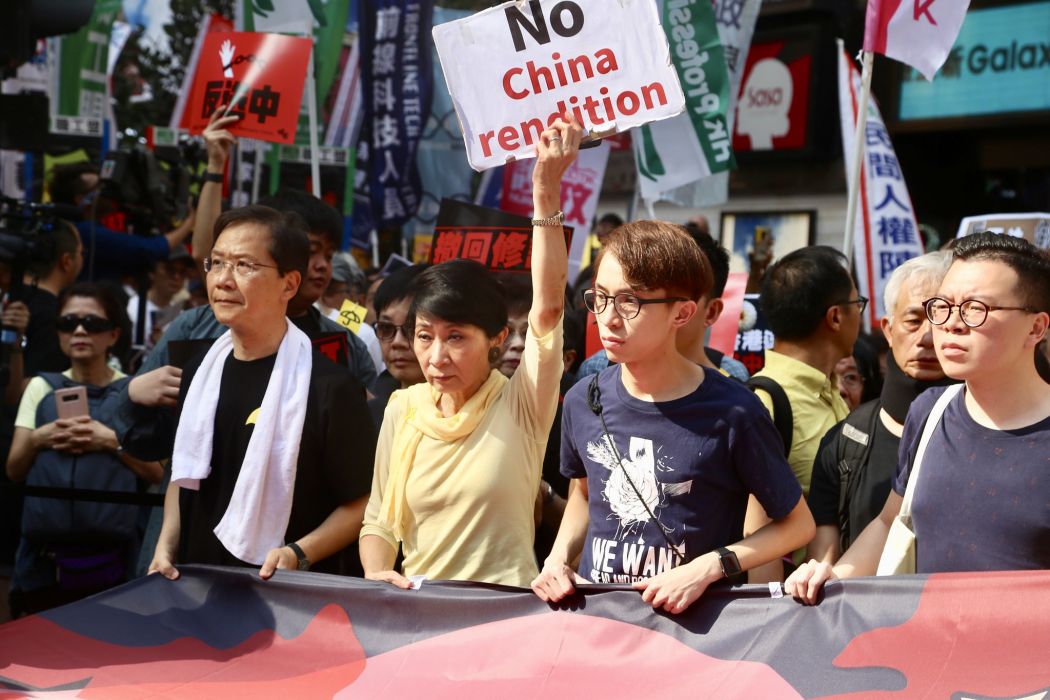
Since vetting by LegCo had been eliminated in the government’s proposal, he wrote, the decision to extradite will actually be made at the “sole discretion of the Chief Executive,” thus adding “enormously” to his or her power. The power is especially significant “since the Chief Executive can hardly refuse any extradition request from the Central Authorities…”.
It follows that “this arrangement will not be limited to rare and exceptional circumstances but may become a regular extradition arrangement as between Hong Kong and mainland China without additional safeguards that are usually introduced by treaties when they are negotiated.”
The proposal would also put Hong Kong’s courts in a difficult position since they will be signing off on the individual cases for extradition and in effect, “adjudicating upon whether the legal and judicial systems in mainland China are sufficiently compliant with relevant human rights standards that need to be satisfied before extradition may be granted.”
Professor Chen concluded that if the government insists on proceeding, further modifications should be introduced, and non-retroactive application considered. He also commended Michael Tien’s suggestion about trying Hong Kong citizens in Hong Kong courts for crimes committed on the mainland.
The wider world
Finally, there is one more relevant source of disapproval that Beijing likes to say it ignores but, in reality, does not. Chinese leaders want to be able to continue proclaiming that Hong Kong’s unique post-colonial One Country Two Systems experiment is a great success. This time, however, a few voices have been raised to warn, in more forceful ways than usual, that the extradition bill is likely to have some seriously negative consequences for Beijing’s Hong Kong experiment.

Activists have resumed their lobbying trips to London and Washington, following a well-worn path pioneered in the 1980s and 1990s. Lobbying was the norm for everyone when plans were being made and agreements drafted ahead of the 1997 transfer from British to Chinese rule.
Since then, Beijing has remained the jealous guardian of its sovereignty over Hong Kong and routinely blames “foreign force” interference for all expressions of international disapproval. These come mainly from the British and American governments but despite the ensuing blasts from Beijing, local activists are never satisfied with what they see as little more than diplomatic courtesies written on the wind.
The US State Department carefully monitors the erosion of rights and freedoms here, but its reports inevitably conclude with a thumbs-up for the integrity of Hong Kong’s One Country Two Systems project.
This time, at least, the conclusions were not so polite. Key findings from a review of the proposed extradition bill by the US-China Economic and Security Review Commission announced on May 7: “If approved by Hong Kong’s Legislative Council, the results would increase Hong Kong’s “susceptibility to Beijing’s political coercion and further erode Hong Kong’s autonomy.”
The legislation “could create serious risks for U.S. national security and economic interests in the territory.”
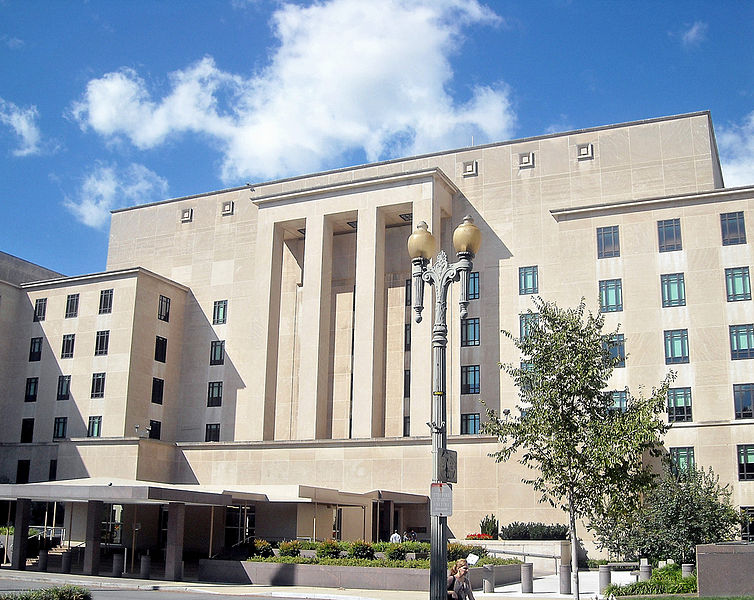
Finally, “as Beijing accelerates its encroachment on the territory’s autonomy and guaranteed freedoms,” the bill could provide Beijing with a “powerful legal tool to further intrude into Hong Kong’s affairs.”
Not the usual diplomatic niceties and neither was the long-distance shouting match between Hong Kong’s last British governor, Chris Patten, and its current Chief Executive. She has been arguing that the lack of an extradition agreement with the mainland is simply a “loophole,” something left over from the transition to Chinese rule in 1997. Last week, speaking in LegCo, she insisted that those who say the loophole had been left deliberately due to fear of China’s legal system were indulging in “trash talk.”
To which Patten replied, from half a world away, that when preparations were being made in the 1990s, all sides knew and accepted that a “firewall” had to be maintained between the Hong Kong and mainland legal systems. He said to pretend otherwise was “untrue and absurd.”
There are lessons to be learned all around this story. For Beijing, the headaches will continue. Its effort to discredit and defeat Hong Kong’s democracy movement has not succeeded.
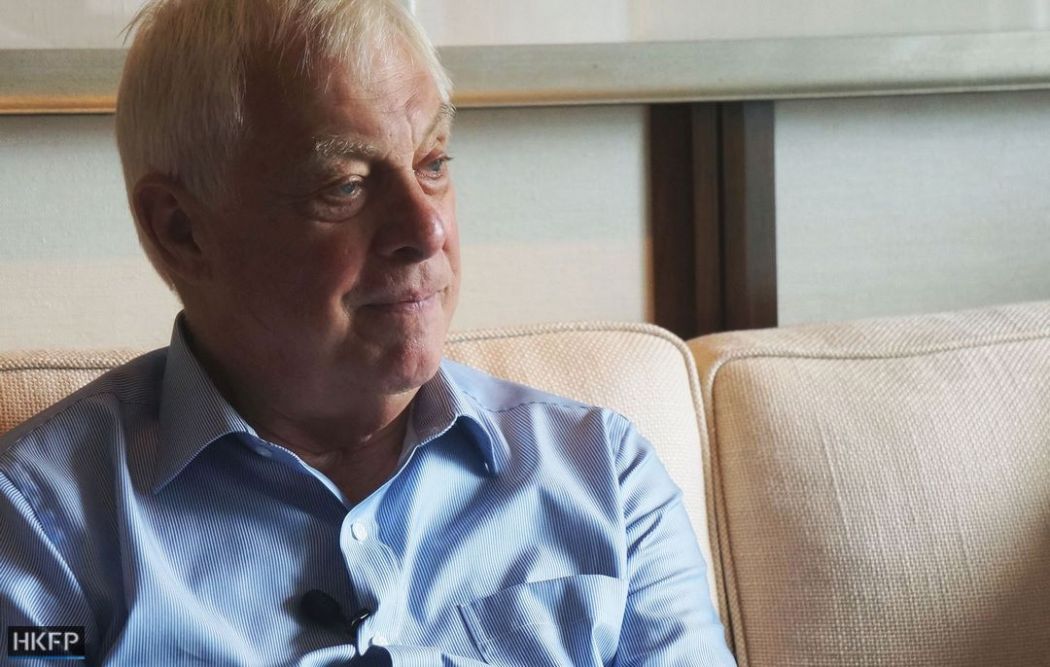
The kind of clampdown that subdued China’s own democracy movement after 1989 cannot yet be imposed here because the One Country Two Systems formula is still providing a buffer of internal protection. Hong Kong streets, whether for occupying or marching, can still be transformed into important political resources.
But partisans can also now count the cost, and not only of losing seats in the Legislative Council to the government’s purification campaign. That cost was compounded by failing to elect the stand-in pro-democracy replacement candidates that were not to the post-Occupy generation’s liking. Election officials had focused on disqualifying prospective candidates with the more defiant “post-Occupy” mindset.
Now, without the votes needed to defeat the “evil” bill, those who remain can only resort to delaying tactics, what’s left of their once effective filibustering powers plus physical obstruction.
Ultimately, if the bill is passed into law, all will be the losers together. And if it fails, the credit will be due to members of the pro-business and pro-establishment coalition that seems on course to play the same role in 2019 that saved the day in 2003.
Kong Tsung-gan‘s new collection of essays – narrative, journalistic, documentary, analytical, polemical, and philosophical – trace the fast-paced, often bewildering developments in Hong Kong since the 2014 Umbrella Movement. As Long As There Is Resistance, There Is Hope is available exclusively through HKFP with a min. HK$200 donation. Thanks to the kindness of the author, 100 per cent of your payment will go to HKFP’s critical 2019 #PressForFreedom Funding Drive.

